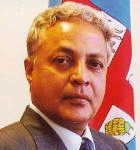| Connecting
over 25 millions NRIs worldwide |
|
|||||||||||||||||||||||
|
||
Former Fiji leader bailed on emergency charge Chaudhry, who was ousted in a revolt by extremist indigenous Fijian businessman George Speight in 2000, a year after becoming the first ethnic Indian elected to power, had been held in custody since being arrested with five other men Friday. Former Fiji leader arrested by military regime Chaudhry, who was ousted by hardline ethnic nationalists in 2000, one year after becoming the first ethnic Indian elected to power, was in custody and scheduled to appear in court Monday. xxxxxxxxxxxxxxxxxxxxxxxxxxxxxxxxxx Former prime minister of Fiji Mahendra Chaudhry Bavadra's widow, Kuini (now Adi Kuini Speed) took the leadership of the party after her husband's death in 1989, but was deposed in 1991 by Mahendra Chaudhry. She later left the party (in 1995) after objecting to the direction in which Chaudhry was taking it. In the 1990s, the Labour Party lost most of its ethnic Fijian support, and the 1994 election showed that its support among Indo-Fijians was declining as well. It won only 7 seats that year. The fortunes of the Labour Party revived in the later 1990s, as the government of Prime Minister Sitiveni Rabuka became unpopular amid admissions of womanizing and reports of high-level corruption in his administration. In the election of 1999, the Labour Party swept to power, winning 37 seats in the 71 member House of Representatives. Chaudhry became Fiji's first Indo-Fijian Prime Minister. On May 19, 2000, Chaudhry's government was overthrown in a putsch led by George Speight, a businessman whom the Labour government had fired from management of Fiji's lucrative pine industry. Elections to restore democracy were held in September 2001; the Labour Party, hurt by intra-party fighting and the defection of key figures including Tupeni Baba, won the most votes (34.8 percent), but only 28 of the 71 seats in the House of Representatives (Fiji), four less than the United Fiji Party of Laisenia Qarase. The inability of the Labour Party and National Federation Party (NFP) (the only other political party with significant Indo-Fijian support) to reach a deal on exchanging "preferences" in Fiji's transferable voting system, and the NFP's decision to give its preferences to the United Fiji Party instead, probably cost Labour the election: despite their having been allies in the 1980s, the two parties have since become bitter enemies. Since 2001, Mahendra Chaudhry has survived a leadership challenge and has rebuilt the Labour Party. In recent times, it has won several key byelections, and appears well-placed to mount a credible challenge to the Qarase government in 2006. Chaudhry's strained relationship with Prime Minister Qarase has prevented the Labour Party from being represented in the Cabinet, despite the constitutional stipulation that any political party with more than eight seats in the House of Representatives is entitled to proportionate representation in the Cabinet. On July 18, 2003 the Supreme Court of Fiji ruled that Qarase's exclusion of the Labour Party breached the constitution, and demanded that the situation be rectified. Negotiations, appeals, and counter-appeals followed, which delayed the appointment of Labour Party ministers. In June 2004, the Supreme Court ruled that the Labour Party was entitled to 14 out of 30 Cabinet posts. Qarase announced that he would accept and implement the order, but his refusal to include Chaudhry himself in any cabinet lineup has continued to stall negotiations about the composition of the cabinet. As of September 2004, the situation remains unresolved.
|
||
| |
|
Mahendra Pal Chaudhry (born 9 February 1942) is a Fijian politician and the leader of the Fiji Labour Party. He defeated the long-time former leader, Sitiveni Rabuka, the former trade union leader became Fiji's first NRI Prime Minister on May 19, 1999 After one year later, on May 19, 2000 he and most of his Cabinet were taken hostage by the hardline Fijian nationalist leader George Speight in Coup On July 13, he was released and embarked on a tour of the world to rally support. In January 2007 he was appointed as Minister of Finance in the term of Commodore Frank Bainimarama, following another coup Chaudhry is also co-chair of the task force focusing on economic growth He was borne in Jat family from village Bahu Jamalpur in Rohtak District, Haryana India He became an auditor in the Auditor General's office. In 1963, he became Secretary General of Fiji Public Service Association and led first civil service strike. |

